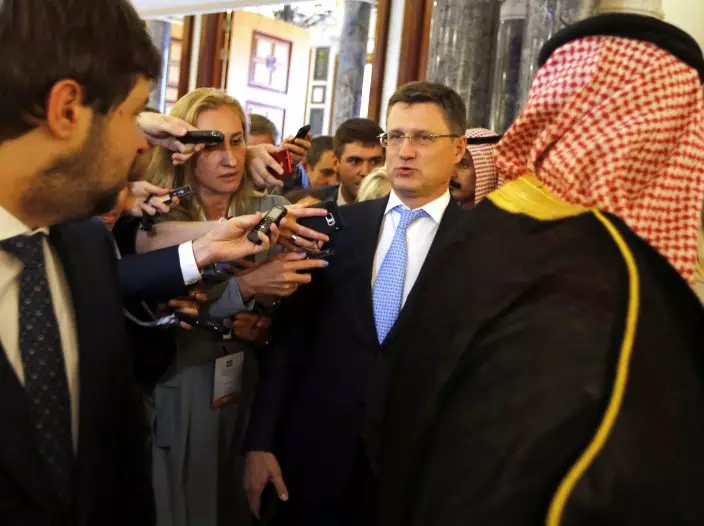The United Arab Emirates' energy minister says he does not think relaxing the oil production cuts in place is the right measure.
Suhail al-Mazrouei spoke to reporters Sunday on the sidelines of a meeting of the world's major oil producers. His comments suggest there's support within OPEC to extend the 1.2 million barrels a day cut in place since January.
As part of the six-month deal reached, OPEC countries, including Saudi Arabia and the UAE, were expected to cut production by 800,000 barrels a day while non-OPEC countries, including Russia, trim 400,000.

Energy ministers from OPEC and its allies meet to discuss prices and production cuts, in Jiddah, Saudi Arabia, Sunday, May 19, 2019. The meeting takes places as tensions flare in the Persian Gulf after the U.S. ordered bombers and an aircraft carrier to the region over an unexplained threat they perceive from Iran, which comes a year after the U.S. unilaterally pulled out of Tehran's nuclear deal with world powers and reimposed sanctions on Iranian oil. (AP PhotoAmr Nabil)
The cuts were aimed at propping up oil prices after a sharp fall last year. Oil is now trading above $70 a barrel and closer to what's needed to balance state budgets among Persian Gulf producers.

Russian Minister of Energy Alexander Novak arrives to attend a meeting of the energy ministers from OPEC and its allies to discuss prices and production cuts, in Jiddah, Saudi Arabia, Sunday, May 19, 2019. The meeting takes places as tensions flare in the Persian Gulf after the U.S. ordered bombers and an aircraft carrier to the region over an unexplained threat they perceive from Iran, which comes a year after the U.S. unilaterally pulled out of Tehran's nuclear deal with world powers and reimposed sanctions on Iranian oil. (AP PhotoAmr Nabil)

Russian Minister of Energy Alexander Novak is surrounded by reporters as he arrives to attend a meeting of the energy ministers from OPEC and its allies to discuss prices and production cuts, in Jiddah, Saudi Arabia, Sunday, May 19, 2019. The meeting takes places as tensions flare in the Persian Gulf after the U.S. ordered bombers and an aircraft carrier to the region over an unexplained threat they perceive from Iran, which comes a year after the U.S. unilaterally pulled out of Tehran's nuclear deal with world powers and reimposed sanctions on Iranian oil. (AP PhotoAmr Nabil)


